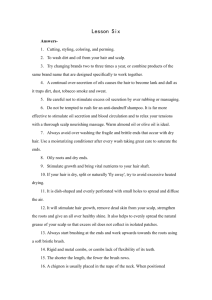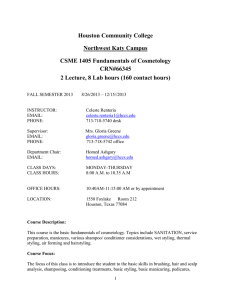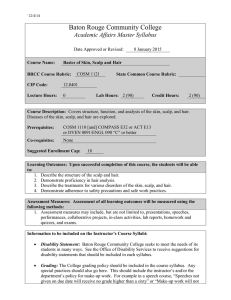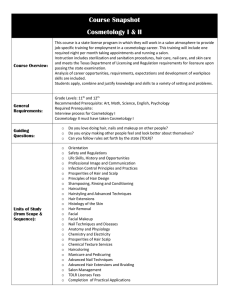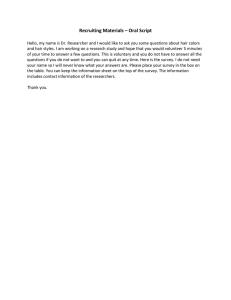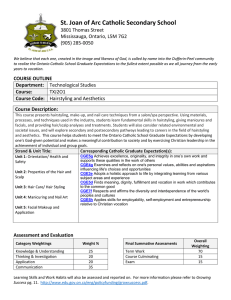Z1405-20SYLLABUS-1.doc2013.doc
advertisement
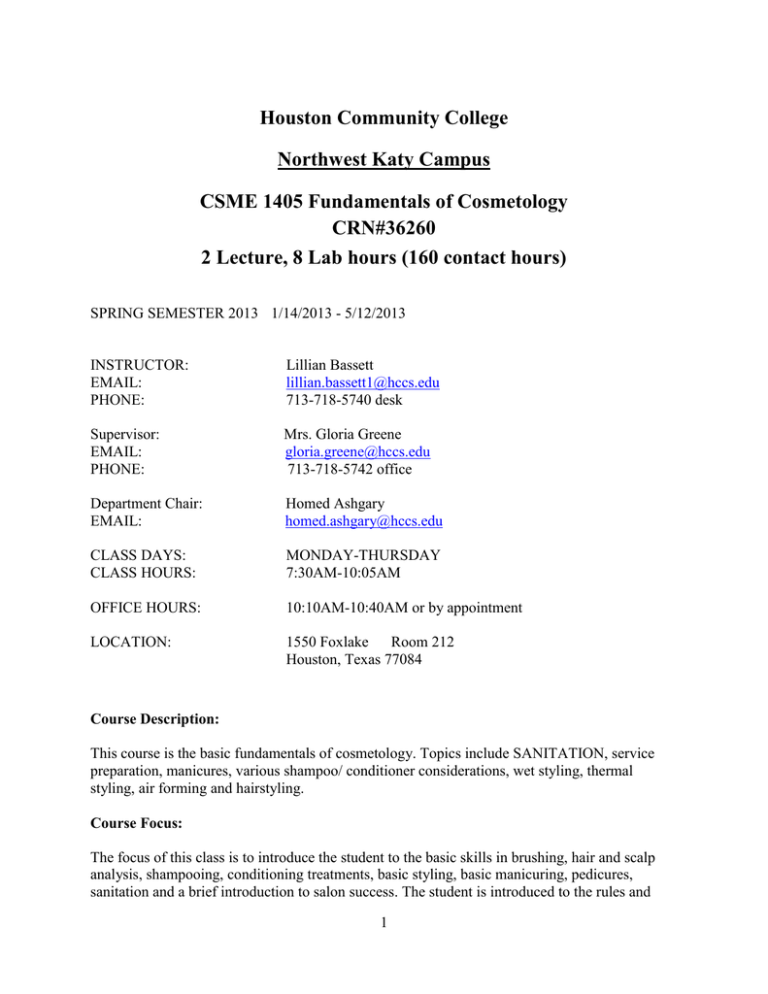
Houston Community College Northwest Katy Campus CSME 1405 Fundamentals of Cosmetology CRN#36260 2 Lecture, 8 Lab hours (160 contact hours) SPRING SEMESTER 2013 1/14/2013 - 5/12/2013 INSTRUCTOR: EMAIL: PHONE: Lillian Bassett lillian.bassett1@hccs.edu 713-718-5740 desk Supervisor: EMAIL: PHONE: Mrs. Gloria Greene gloria.greene@hccs.edu 713-718-5742 office Department Chair: EMAIL: Homed Ashgary homed.ashgary@hccs.edu CLASS DAYS: CLASS HOURS: MONDAY-THURSDAY 7:30AM-10:05AM OFFICE HOURS: 10:10AM-10:40AM or by appointment LOCATION: 1550 Foxlake Room 212 Houston, Texas 77084 Course Description: This course is the basic fundamentals of cosmetology. Topics include SANITATION, service preparation, manicures, various shampoo/ conditioner considerations, wet styling, thermal styling, air forming and hairstyling. Course Focus: The focus of this class is to introduce the student to the basic skills in brushing, hair and scalp analysis, shampooing, conditioning treatments, basic styling, basic manicuring, pedicures, sanitation and a brief introduction to salon success. The student is introduced to the rules and 1 regulations of the Texas Department of Licensing and Regulation (TDLR) pertinent to the practice of cosmetology. This course is a combination of 2 lecture and 8 lab hours (160 contact hours). Upon successful completion of the course, the student will be awarder four semester credit hours. End of Course Outcomes: Students will be able to identify fundamental concepts in relation to the required skills by TDLR; also demonstrate fundamental skills required by the TDLR. External accreditation standard is a passing score of 70% on state licensing examination administered by Texas Department of Licensing and Regulation. Pre-requisites: The student must meet the Texas Department of Licensing and Regulation criteria for enrollment in a cosmetology operator program as well as the requirements for HCC. Academic Prerequisites: College ready reading Co-Requisites: LEAD 1200, CSME 1410 and CSME 1453 Mandatory Text, References and Fees: Milady Standard 2012 Edition Milady Hardcover ISBN-13: 978-1-4390-5930-2 ISBN-10: 1-4390-5930-6 Softcover ISBN-13: 978-1-4390-5929-6 ISBN-10: 1-4390-5929-2 Milady Standard Theory and Practical Workbooks Two (2) photos of yourself (due first day of class) $25.00 gift card (due on the first day of class) Milady 2012 Texas Department of Licensing and Regulation Cosmetologist Rule Book Equipment can be purchased as a kit, in the HCC bookstore on the first floor . STATEMENT OF FOUNDATION SKILLS AND WORKPLACE COMPETENCIES (SCANS) A study was conducted for the Department of Labor by the American Society for Training and Development which identified the seven skills United States employers want most in entry level employees. These skills are motivation to learn, basic skills, communication, teamwork, critical thinking, career development and leadership. 2 HCCS is committed to preparing every student with the knowledge and skills needed to succeed in today’s dynamic work environment. Towards this ends, the following skills will be included in this course. Testing and assessing these skills will vary according to the individual instructor. The following are examples of how these skills may be incorporated into this course. SCANS Matrix A. Three Part Foundation Basic Skills – Reads, writes, performs arithmetic and mathematical operations Listens and speaks Thinking Skills – Thinks creatively, makes decisions, solves problems, visualizes, Knows how to learn and reasons Personal Qualities – Displays responsibility, self-esteem, sociability, selfmanagement And integrity and honesty B. Five Workplace Competencies Resources – Identifies, organizes, plans and allocates resources Interpersonal – Works with others Information – Acquires and uses information Systems – Understands complex inter-relationships Technology – Works with a variety of technologies Course Competencies: This course is designed to assist the student in obtaining the following competencies: a. Draping, Shampooing and Scalp Massage. Drape patron for wet hair services, shampoo, and scalp treatments. Drape patron for dry hair services, brushing etc. Drape patron for comb out services. b. Analyze various scalp and hair conditions Identify various scalp and hair problems Shampoo and rinse the hair. Identify and describe the various types and chemistry of shampoo. Select and apply shampoo for specific patron. Scalp Massage Theory Perform appropriate scalp manipulations while giving a shampoo. Apply specialized reconditioning, medicated cream and color rinses. 3 Yes No x x x x x x x x Aromatherapy for the Scalp c. Know the theory and procedures for scientific brushing and scalp manipulations and hair and scalp treatments. Hair Evaluation Common Hair Conditions Common Scalp Conditions d. Infection Control and Safety Procedure Understand and utilize the required sterilization and sanitation procedures and processes Exhibit knowledge of and practice safety and sanitation methods at all times. Know the sanitation and safety regulations of the TDLR e. Exhibit the ability to complete four basic braiding techniques. Twists Knots Overlaps Braids f. Exhibit the ability to design hair styles using the principles of hair design. Concepts Design System Solid Form- Straight Volume (Air Forming), Volume and Indentation, Curvature Volume, Straight and Curvature Volume g. The Study of the Nail Nail Theory Natural Nail Care Infection Control and Safety Basic Manicure Basic Pedicure Artificial Nail Care Student Learning Outcomes: The student will be able to; A, B and C with a minimal of 75 % competency. A. Demonstrate the proper procedure for analyzing the hair and scalp and applying scalp treatments, and shampooing the hair observing all safety and sanitation guidelines. 4 B. Demonstrate all four basic hair-braiding techniques, (knots, twists, overlapping braids and French braids) on either a manikin or model, observing all safety and sanitation guidelines. C. Demonstrate a basic manicure, observing all safety and sanitation guidelines. The Cosmetology Department does not guarantee that each student will acquire each learning competency nor acquire all the hours necessary to complete the program within a specified period of time. Courses are scheduled at the discretion of the department and the availability of qualified faculty. Course Topics include: A. Infection control and safety precautions B. T.D.L.R. Rules and regulations related to the practice of cosmetology C. Draping, Shampooing and Scalp Massage. D. Scientific brushing and scalp manipulations and hair and scalp treatments E. Basic braiding techniques. F. Principles of hair design. G. Manicuring and pedicuring Assessment of Student Competencies: A. Practical examination B. Written Examinations C. Weekly progress achievement charts D. Individual or group class projects E. Situational observation by instructor (i.e. attendance, ethics conduct and attitude). Grade Determination: This is a suggested matrix, the instructor reserves the right to adjust or change accordingly to meet his/her needs or the needs to the class. Unit Exams/Skill Objectives Mid Semester Attendance Final Exam Professionalism / Portfolio (Time, attitude, neatness) 20% 20% 20% 20% 20% Grade Range: 90-100= A 80-89= B 5 70-79=C 60-69=D Below 60; student will repeat the course. ATTENDENCE AND WITHDRAWAL POLICIES: Students are expected to attend class daily and be on time. Any students absent from class for more than 4 days will be dropped from the program. Students arriving late to class will not be allowed to clock in. Ten points will be deducted for the first day absent from class and 5 for each day thereafter from the attendance grade. Administrative drops are at the discretion of the instructor. It is the responsibility of the student to withdraw from the program to keep from receiving an "F" for the class. Tardiness: After 30 minutes =1pt. Each point will accumulate toward your professionalism grade calculation. If you come to class 8:30 or after, you may attend class, but will not be allowed to sign in for clock hours for this class period. Dress code: Students in the cosmetology operator candidate program are expected to be self-motivated individuals and to stay on task at all times. Students must be dressed professionally and appropriately in accordance with the department dress code and must wear a lab coat at all times. Black Scrub pants Black scrub top, (shirt) Solid Black flat shoes with back and toes enclosed. Socks or house must be worn. No caps, wrap scarves, or sleep caps allowed (except for religious customs confirmed by instructor). Scholastic Dishonesty and Classroom Conduct: Students are expected to conduct themselves with honor and integrity in fulfilling the course requirements. Any student found cheating on a test, plagiarizing or in collusion will receive an "F" for the assignment and the course and will be dropped from the program. See student handbook for college policy on academic dishonesty and disciplinary problems. Make-up policy for missed assignments or tests: 6 There will be no make-up for missed unit exams OR daily assignments. Make-up for a missed mid-term or final test will be permitted only if the student informs the instructor in advance. The student must make arrangements to take the missed test no later than 3 days after the original test date. It should be understood that the make-up test would not be the same as the test given to the student that took the test on the assigned date. HCCS enforces Zero Tolerance. Any student causing classroom disruption can be removed from class by Campus Police and given a ticket resulting in a fine of $500.00. Any profane language, arguing, threats or class disruptions, also may result in a disciplinary probation period, or permanent removal from class! Students with Disabilities The Disability Support Services (DSS) Office assists students with physical, learning or emotional disabilities in developing independence and self-reliance. Services include adaptive equipment and reasonable accommodations for admissions assistance, testing, and academic advising, registration and classroom instruction. Students with special needs or disabilities, which may affect their ability to succeed in college classes or participate in college/programs/activities, should contact the Disabilities Support Services (DDD) located at each college. Academic accommodations will be provided only after students have properly registered for services through designated disability services staff. The student is advised to contact the DSS Office at least 60 days prior to the beginning of the term. See additional procedures outlined in the HCCS Student Handbook. Disability support services can also be found online at these Web sites: http://www.rehab.state.tx.us http://www.ican.com Student Information: Related Web Sites Texas Department of Licensing and Regulation Web Site: www.license.state.tx.us Notice: Students who repeat a course three or more times may face significant tuition/fee increases at HCC and other Texas Public Colleges and Universities. Please ask your instructor / counselor about opportunities for tutoring / other assistance prior to considering course withdrawal or if you are not receiving passing grades 7 Daily homework: Students are responsible to read each assigned chapter prior to class and for completing Workbooks! Cell Phones: The use of cell phones are not permitted in classroom ( this includes texting)! You may keep your phone on vibrate. In event you need to use your phone, you may quietly step into the hall for 2 minutes. After 2 minutes the instructor has the right to have you sign out of class. Course Calendar: (This calendar may be revised) EXAMS WILL BE GIVEN EVERY THURSDAY @ 8:00 a.m. You will need a scantron for every exam. Week: 1. HCC Katy Rules and Regulations TDLR Rules and Regulations Orientation/ Syllabus Quiz Supplies 2. Chapter 1 Chapter 2 Chapter 3 Chapter 4 History and Career Opportunities Life Skills You’re Professional Image Communicating for Success 3. General Sciences Chapter 5 Infection Control: Principles and Practices 4. General Sciences Chapter 11 Properties of the Hair and Scalp 5. Hair Care Chapter 17 Hairstyling Wet Hairstyling Basics Finger Waving Roller Curls Comb-Out Techniques Hair Wrapping 6. Chapter 17 Hairstyling Blow-dry Styling 8 Thermal Styling Thermal Straightening (pressing) 7. Chapter 17 Hairstyling Styling Long Hair Formal Styling 8. MID-TERM 9. Chapter 18 Braiding and Braid Extensions 10. General Sciences Chapter 9 Nail Structure and Growth 11. Chapter 10 Nail Disorders and Diseases 12. Chapter 25 Nail Care, Manicuring 13. Chapter 26 Pedicuring 14. Salon Management /Review TDLR Rules and Regulations 15. Review for Finals 16. Final Exam Holiday schedule: Monday, January 21, 2013 Dr. Martin Luther King Day Monday, February 18, 2013 Presidents Day Monday, March 11 thru Friday March 29, 2013 Spring Break Monday, May 27,012 Memorial Day 9
